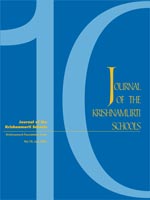Issue 10 - July 2006
- Written by J. Krishnamurti
Question: What is the significance of history in the education of the young?
- Written by Ahalya Chari
It all started with a feeling that the legacy that Krishnamurti had left us in the form of his vision of education was something precious that had to be conserved, explored and shared.
- Written by Dr. C. Seshadri
Scholarly research into the philosophy of education abounds with accounts of contributions of several educational and social leaders to the understanding and practice of education.
- Written by Mary Cadogan
I have been asked to contribute to the Journal which is now marking the first decade of its existence, and I am happy to do so because of my involvement in the work of the Foundations, which, of course, can be seen at so many levels as part of the world of education.
- Written by Paul Herder
It's a sun drenched Wednesday morning and fifteen freshman and twelve sophomore high school students sit as one large group in a circle.
- Written by N. Venu
The Brain Sciences have made dramatic progress in the last two decades.
- Written by Krishna Kumar
As you mellow, the urge to compromise hits oftener, but latecomers continue to annoy me.
- Written by Leela Samson
Long before a child sees that the world is made up of books and classrooms he is aware that he can do the most amazing things with his hands and feet.
- Written by Siddharth Menon
There is a parable of a passer by who encountered three workmen cutting stones on a vast building site.
- Written by Colin Foster
I would like to share my concern for the teaching and future of my subject, as also to suggest the basis of the way that I would proceed, should I get the opportunity to teach again.
- Written by Neerja Ragahvan
Like the wandering minstrel of yore, Agastya International Foundation's Mobile Laboratory (ML) trundles in and out of schools in villages of Andhra Pradesh and Karnataka.
- Written by G. Gautama
It is not bigotry to be certain we are right; but it is bigotry to be unable to imagine how we might possibly have gone wrong.
- Written by Ray McCoy
It is a great privilege to be involved in editing Krishnamurti's works.
- Written by Usha Mukunda
Why do we want our children to read? I refer to the wide range of books in fiction and non-fiction, which are perused by children and young adults from ages six to eighteen.
- Written by Gita Wolf
Children in India traditionally grew up listening to stories.
- Written by Devdas Menon
Pre-conventional, Conventional and Trans-personal Stages of Development Recent psychological studies in human development suggest an interesting three-stage model of development: pre-conventional, conventional and trans-personal (or post-conventional).
- Written by Thomas E Jackson
A paramount objective of education is to help children develop their ability to think for themselves and to learn to use this ability in responsible ways.
- Written by Raji Swaminathan
A distinctive feature of holistic education is nurturing the spirit.
- Written by Kartik Kalyanram
As a teacher, house parent and a parent, not necessarily in that order, I have often wondered at the seemingly irreconcilable differences between an energetic, impulsive, complaining, 'immature', angst ridden adolescent and the staid, 'mature', orderly adult.
- Written by Suchitra Ramkumar
What does health mean to young people? They are active and energetic and rarely lack in physical vitality.
- Written by Stephen Smith and Alok Mathur
We are apt to feel, in the cut and press of daily life and in the fulfilment of our responsibilities to the school and to its students, that our lives are caught up in minutiae: ongoing lesson preparation, correction of papers, assessment, examinations, meetings and administrative decisions.
- Written by S. Ramachander
Career Choice, a critical juncture The choice of a career is and will always be one of two most critical decisions in the first few years of one's adulthood -- rivalled only by the choice of a mate.
- Written by Dr. Gideon Arulmani
The meaning and purpose of work Work is as old as the history of mankind.
- Written by Valentin Gerlier
Philosophy, perhaps more than any other academic discipline, is thought to deal with intellectual things, or 'ideas'.
- Written by Alok Mohanty
We see around us three kinds of attitudes related to the body.
- Written by Michael Mendizza
As Merlin was to young King Arthur, so every adult must become to every child.


